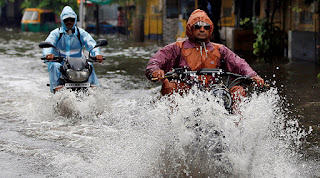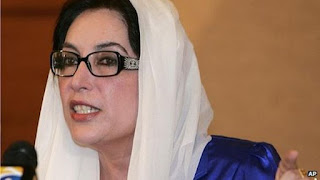By ISABEL KERSHNER
A picture from an Israeli satellite and annotated by an Israeli satellite company showing what analysts said was a construction site for an Iranian long-range missile production facility in northwestern Syria. Credit Imagesat International NV, via Reuters
JERUSALEM — Israel is using a visit this week by the United Nations secretary general, Antonio Guterres, to highlight concerns about what it says are Iran’s efforts to produce advanced, precision weapons in Lebanon and Syria.
“Iran is busy turning Syria into a base of military entrenchment,” Prime Minister Benjamin Netanyahu said at a news conference with Mr. Guterres on Monday, “and it wants to use Syria and Lebanon as war fronts against its declared goal to eradicate Israel.”
Mr. Netanyahu asserted that Iran “is building sites to produce precision-guided missiles toward that end in both Syria and in Lebanon.”
He added: “This is something Israel cannot accept. This is something the U.N. should not accept.”
Israel’s defense minister, Avigdor Lieberman, also spoke in his meeting with Mr. Guterres about Israel’s concerns about factories for precision weapons and what he called Iran’s repeated attempts to smuggle arms into Lebanon.
“We are determined to prevent any threat to the security of the citizens of Israel,” Mr. Lieberman said, according to a transcript of his remarks from his office.
The assertions are not new, but Israel now appears to want to put them on the international agenda.
Israel’s chief of military intelligence, Maj. Gen. Herzl Halevi, told an audience at a policy conference in Herzliya, Israel, in June that Iran had been working over the past year to set up independent production facilities in Lebanon to manufacture precise weapons, which use advanced technology to guide them to specific targets.
The beneficiary, he said, would be Hezbollah, the Lebanese Shiite organization, with which Israel fought an inconclusive, month-long war in 2006. Adding that Iran was setting up similar facilities in Yemen, General Halevi warned, “We cannot remain indifferent to this and we don’t.”
Prime Minister Benjamin Netanyahu of Israel raised concerns about Iranian weapons factories in Lebanon and Syria with United Nations Secretary General Antonio Guterres in Jerusalem on Monday. Credit Thomas Coex/Agence France-Presse — Getty Images
Israeli leaders also pressed Mr. Guterres to prod the United Nations peacekeeping force in Lebanon, UNIFIL, into fulfilling its mandate to prevent Hezbollah’s weapons buildup.
“I will do everything in my capacity to make sure that UNIFIL fully meets its mandate,” said Mr. Guterres, visiting Israel and the Palestinian territories for the first time since taking up the top United Nations post in January. He added that “the idea or the intention or the will to destroy the state of Israel is something totally unacceptable from my perspective.”
Israel has carried out several airstrikes in Syria in recent years against convoys or stores of advanced weapons said to be destined for Hezbollah in Lebanon. Acting under the cover of the Syrian civil war, the Israeli strikes have prompted little retaliation from Hezbollah, which is fighting in Syria to prop up the government of President Bashar al-Assad, an Iranian ally.
Through Hezbollah and other proxies, Iran has been extending its influence and its reach in the region and, according to Israeli officials, is working to provide Hezbollah with more precise weapons to hit valuable targets in its next war against Israel.
But while Israel has acted with relative impunity in the chaotic environment of Syria, any pre-emptive strike on Lebanese soil could spiral into a broader conflict over Israel’s northern border.
Israel’s Yedioth Ahronoth newspaper reported this week that in the face of the Israeli warnings, Prime Minister Saad Hariri of Lebanon has been working to stop Iran’s construction of the missile factory in his country.
More generally, Israel has been voicing concern that arrangements for cease-fires and de-escalation zones in southern Syria will help Iran and its loyalists consolidate their presence across Israel’s frontiers.
Last week Mr. Netanyahu traveled to Sochi, Russia, on the Black Sea to confer with President Vladimir Putin. “The victory over ISIS is welcome,” Mr. Netanyahu told Mr. Putin, referring to the Islamic State, which has been battling Mr. Assad’s forces. “Iran’s entry is unwelcome, endangering us, and in my opinion, endangering the region and the world,” Mr. Netanyahu said, according to his office.
Israeli officials have also raised these concerns with American officials.
Annaza (see map at top) is about 20 km northeast of Tartus



















